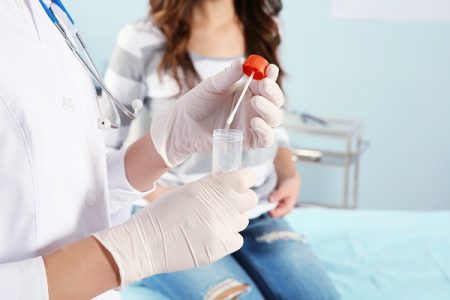
Chlamydia, a sexually transmitted disease spreads by sexual contact with an infected person. A person suffering from Chlamydia should keep away from sexual activity for about 7 days of treatment or until the completion of treatment to prevent spreading of infection to the partner.
How is Chlamydia treated?
It can be treated easily with the help of antibiotics; however, medications for chlamydia should not be shared with anyone. Treatment can stop the infection but cannot repair the permanent damage caused because of it. If the symptoms of infections continue after medication, the person should immediately consult his/her doctor about it for re-evaluation.
Read about Chlamydia symptoms.
Repeated infections are common in chlamydia. Women whose partners have not been treated properly or has not taken a complete course of medications are at high risk. Re-occurrence infections in women may result in serious reproductive complications and ectopic pregnancy.
Read about the complications here.
A person having a prior history of chlamydia should get tested after every three months, whether he/she shows symptoms or not. New born babies infected with chlamydia may develop ophthalmia neonatorum (conjunctivitis) and/or pneumonia. Chlamydial infection in infants and adults can be effectively treated using antibiotics.
More than 95% of people treated using antibiotics are cured. HIV positive person with chlamydia should receive the same treatment as others. People can start taking medications as soon as they are tested positive for chlamydia infection and their doctor prescribes medications.
The two most commonly given medications for curing chlamydial infections are:
- azithromycin
- doxycycline
Some doctors may also prescribe other antibiotics like amoxicillin or erythromycin in case the women are pregnant or breastfeeding. In severe or extreme cases, doctors do prescribe medications longer than a week.
Some people also experience side effects of these antibiotics like belly pain, diarrhea and vaginal thrush (women).
Uncomplicated infection
For not so severely infected person, a single dose of azithromycin (Zithromax) is recommended by the doctors. Doxycycline (Vibramycin) is also recommended twice a week. Both the antibiotics have similar cure rate and side effect profile.
Vomiting by the patient within one or two hours of taking medications should be considered as a warning sign. Apart from these two majorly recommended antibiotics, erythromycin, ofloxacin and levofloxacin are also prescribed by the doctors.
Follow up of patients is also important in the cases where symptoms persist or reoccur. Patients are usually advised to abstain from intercourse for about seven days or till the time treatment continues so as to avoid the spread of infection to the partner. Even though the infection may reoccur, some doctors do not recommend a repeated check up after antibiotic treatment unless the patient is pregnant.
Severe infection
Untreated chlamydia infection ultimately results in Pelvic Inflammatory diseases or PIDs. Though hospitalization is not required in the case of PIDs, if the patient is pregnant or has a severe illness like vomiting (or nausea) with high fever, the patient needs to be admitted immediately.
In cases where the patient is not responsive or is unable to tolerate oral regime, it is important to consult a doctor. It can be a surgical emergency if the women have tubo-ovarian abscess.
Following are the antibiotics prescribed by the doctors in case of severe infections
- ofloxacin
- levofloxacin
Both the antibiotics may be recommended with or without another medicine, metronidazole.
Apart from above-mentioned antibiotics, alternative medicines are also prescribed which are:
- ceftriaxone
- cefoxitin
- cephalosporin with doxycycline
- clindamycin with gentamicin
- ofloxacin
- levofloxacin
- ampicillin/sulbactam
Infection during pregnancy
Chlamydial infection during pregnancy needs immediate care and consultation with the doctor. Doxycycline and ofloxacin are not prescribed during pregnancy. Therefore, doctors generally advise erythromycin base or amoxicillin for the treatment of chlamydial infection during pregnancy. Amoxicillin in comparison to erythromycin is more effective and have fewer side effects.
Alternate antibiotics are:
- erythromycin base or erythromycin ethyl succinate
- azithromycin (Zithromax)
Testing should be performed for complete cure of Chlamydia in a patient who is pregnant or planning a baby. There is always a risk of re-exposure and reoccurring of infection.
Read about testing and diagnosis of Chlamydia.
Infection in children
Infants usually get this disease from the infected mother during delivery. Cases in which a child is near puberty or adolescent may occur because of child abuse.
Exposure to Chlamydia Trachomatis during delivery can cause conjunctivitis or pneumonia in neonates. Following is the medication prescribed for infants having this serious disease:
- prophylaxis with silver nitrate or antimicrobial ointment
- erythromycin base or ethyl succinate






